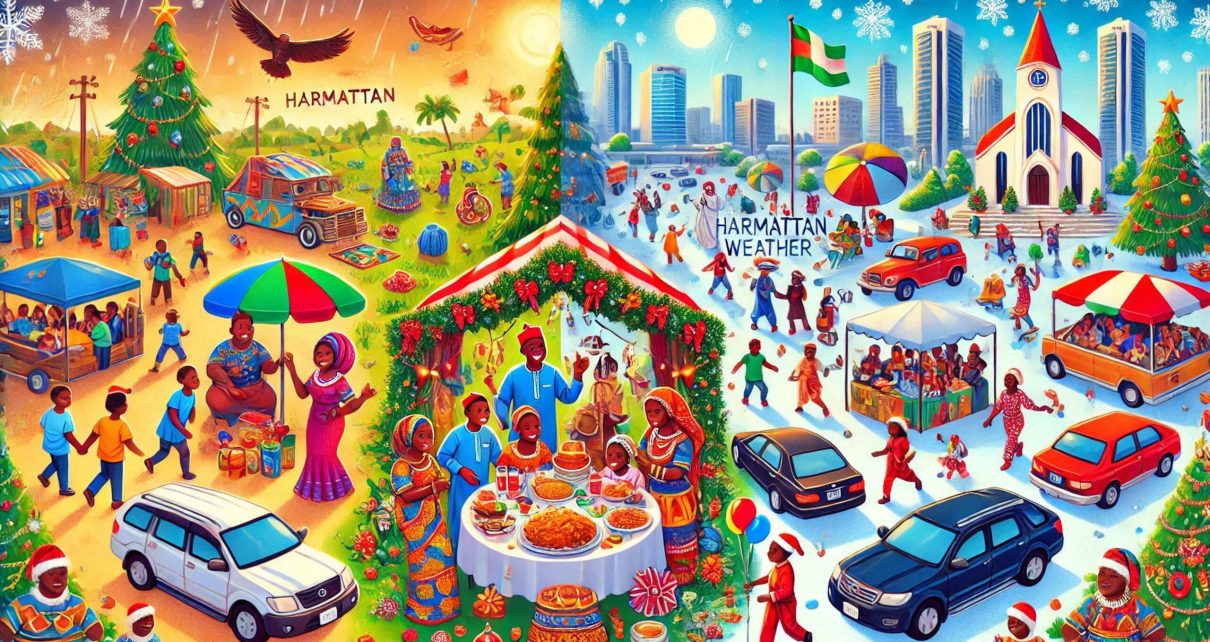
A few years ago, my immediate younger brother, who wasn’t in the country at the time, happened to be in Scotland studying for a Master’s degree and couldn’t make it home for Christmas. So we could only talk on the phone and via chat messages. I asked him what Christmas was like in Scotland. I was expecting an exciting story based on the Christmas movies we’d watched, using my very typical Nigerian experience as a standard of what it would be like in other countries.
He said he was home alone and not much was happening because everywhere was quiet. I wasn’t expecting that kind of answer, but it made me curious enough to really find out what Christmas was like in other countries.
As a child, Christmas was—and still is—the best time of the year. Every Nigerian takes it seriously and plans ahead for it. There’s a particular tribe I know that starts their celebrations on the 1st of December. I always pity the organizations that employ them because these guys practically leave their jobs and travel to their villages on the first of December. They don’t care. Then there’s the other tribe who never return until the 30th day of the New Year. I have to laugh here—it’s crazy, I know.
So many things make Christmas special. The harmattan, all the carol services organized by churches, the songs, the merriment—even the smell of green pepper, for me, instantly takes my mind to fried rice. I live in the city, so I also look forward to it being emptied out when many people travel back home. Less noise, no traffic, but still so much fun around.
Organizations throw end-of-year parties. Hotels, lounges, and clubs also come up with shows and events. Schools do their thing, and even estates and communities host residents for fun activities. A visit to Santa isn’t as much of a thing these days as it was for me as a child. The same goes for the fireworks and knockout craze. And I’m not even embarrassed to say I miss those two. We also always got new clothes for Christmas—Christmas shoes and Christmas hair. I’m laughing as I type this. I think my generation had the most fun because Gen Zs and Gen Alphas can’t relate.
I reached out to friends living in other countries who had all experienced the Nigerian Christmas, and one thing was consistent: they all miss our kind of Christmas. Ruth in the U.K. said all festivities end on Christmas Eve. Even public transport isn’t available. Everyone is home with family on Christmas Day. Dorothy in Germany said baking starts on the 1st of December. Things are baked and stored up, so there’s usually lots to eat, but like Ruth in the U.K., it all ends on the 24th. The good thing is, these times are also spent with family.
Ene and Helen in Canada said Canadians do not joke with decorations and lights—they all try to outdo themselves. There’s also the seasonal joy of skating for outdoor enthusiasts, with ice rinks scattered across the city. Massive shopping for gifts for loved ones is common, thanks to discounts that make it possible. Helen mentioned that kids there do not joke with Santa.
Debbie in the U.S. said many families participate in the tradition of exchanging gifts, often placed under the Christmas tree. Special church services, family dinners, and various holiday-themed activities often mark Christmas Eve. Some families may attend Mass or engage in other religious observances.
Ugochukwu in Australia shared that Christmas is a sunny, festive affair. Outdoor celebrations take center stage, with families and friends gathering for picnics and barbecues in parks or backyards, enjoying seafood and salads.
My favorite tribe in Nigeria, the Igbos, takes this whole thing to another level—a beautiful level, I must say. Ever wondered about their exodus or pilgrimage-like travels in December? You’re about to find out. Wherever they are in the city or abroad, they always travel back home in December. This is because three-quarters of traditional marriages are observed at home and in December. Families hold meetings to review the current year and plan for the coming year. There’s plenty of catching up with old friends, family reunions, and age group meetings.
To this effect, renovations of buildings, repainting, and beautification of compounds are common, including the mounting of canopies to receive guests. Many save money all year for this period to entertain visitors and to settle apprentices who have completed apprenticeship programs. It’s also a time for well-meaning individuals to form alliances for the growth and development of their communities. And there’s lots of visiting between newlyweds and in-laws.
Masquerades are also part of the festivities. I have a not-so-fond memory of being frightened by one in 1991.
In Nigeria, everywhere is never silent. It can never be silent. It should never be silent, in fact. Unlike these other countries that tone it down on Christmas Eve, we actually turn it up from the 24th and don’t stop until maybe the 2nd of January. That’s a fact. If your music isn’t disturbing others, their music and celebrations will disturb you—and we love it like that.
Merry Christmas! 🎄🎁🥂
- Joy Mfon Essien is an Entrepreneur and the CEO, of Discover Essence Media, Millionaire Woman Soapworks and Delicioso Foods. Writer, TV presenter and producer, Wellness Coach and mom of two.


